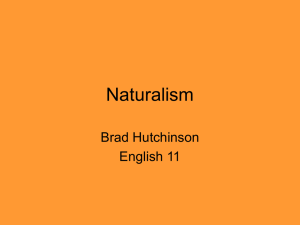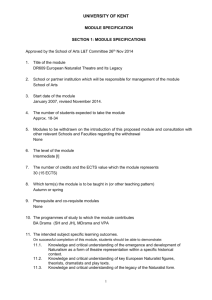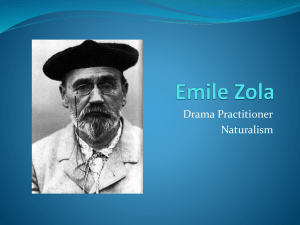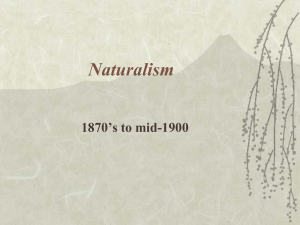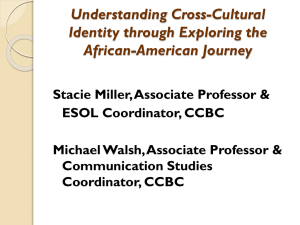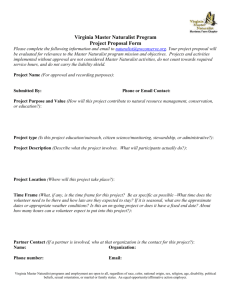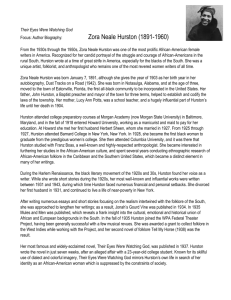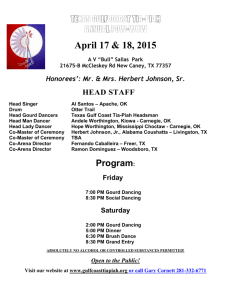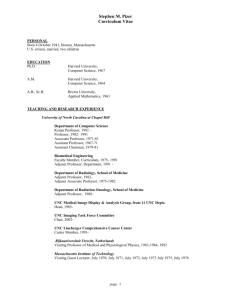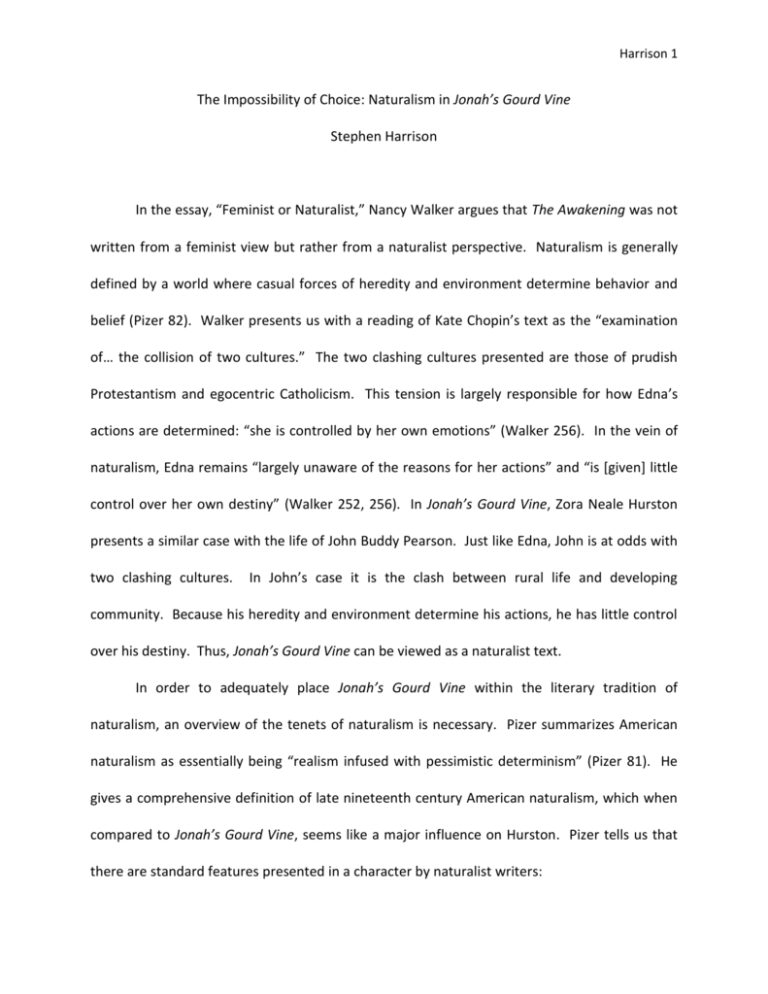
Harrison 1
The Impossibility of Choice: Naturalism in Jonah’s Gourd Vine
Stephen Harrison
In the essay, “Feminist or Naturalist,” Nancy Walker argues that The Awakening was not
written from a feminist view but rather from a naturalist perspective. Naturalism is generally
defined by a world where casual forces of heredity and environment determine behavior and
belief (Pizer 82). Walker presents us with a reading of Kate Chopin’s text as the “examination
of… the collision of two cultures.” The two clashing cultures presented are those of prudish
Protestantism and egocentric Catholicism. This tension is largely responsible for how Edna’s
actions are determined: “she is controlled by her own emotions” (Walker 256). In the vein of
naturalism, Edna remains “largely unaware of the reasons for her actions” and “is [given] little
control over her own destiny” (Walker 252, 256). In Jonah’s Gourd Vine, Zora Neale Hurston
presents a similar case with the life of John Buddy Pearson. Just like Edna, John is at odds with
two clashing cultures.
In John’s case it is the clash between rural life and developing
community. Because his heredity and environment determine his actions, he has little control
over his destiny. Thus, Jonah’s Gourd Vine can be viewed as a naturalist text.
In order to adequately place Jonah’s Gourd Vine within the literary tradition of
naturalism, an overview of the tenets of naturalism is necessary. Pizer summarizes American
naturalism as essentially being “realism infused with pessimistic determinism” (Pizer 81). He
gives a comprehensive definition of late nineteenth century American naturalism, which when
compared to Jonah’s Gourd Vine, seems like a major influence on Hurston. Pizer tells us that
there are standard features presented in a character by naturalist writers:
Harrison 2
His characters are the poor, the uneducated, the unsophisticated… His fictional world
is… commonplace and unheroic… But the naturalist discovers in this world those
qualities of man usually associated with the heroic or adventurous, such as acts of
violence and passion which involve sexual adventure or bodily strength and which
culminate in desperate moments and violent death. (Pizer 82)
The most important facet of a naturalist work is how the characters actions are depicted and
dictated. Pizer tells us that, “The naturalist often describes his characters as though they are
conditioned and controlled by environment, heredity, instinct, or chance” (Pizer 83). Almost
everything except a character’s own reason and intellect will dictate their actions in a naturalist
text. These actions are determined by things outside of their own control. The pessimism Pizer
notes is located in the culmination and climax of the naturalist novel. This climax is marked by
a fleeting, desperate moment which results in a gruesome death for the protagonist. Thus, the
character’s actions are deemed futile in a world where their destiny has already been decided.
Comparing these characteristics to Jonah’s Gourd Vine reveals the novel as a naturalist
text. From the first chapter, we learn that John’s family is poor and are sharecroppers. His
mother and stepfather were formerly slaves. After a violent altercation with his stepfather,
John sets out to leave his family to work. He tells his mother, “Ah wants to make money,”
(Hurston 11). John is not just poor but also uneducated. In Chapter 2, he sees his first
schoolyard: “So! This must be the school that he had heard about” (Hurston 13). (Note the
integration of John’s recognition and surprise as being portrayed through the voice of the
narrator, presumably that of Hurston’s. This form becomes important later in the portrayal of
John’s actions.) During this scene, we get a sense of his unsophistication: “He felt ashamed of
Harrison 3
his bare feet for the first time in his life. How was he to know that there were colored folks that
went around with their feet cramped up like white folks” (Hurston 14). As Pizer has indicated,
in a naturalist text, the protagonist is poor, uneducated, and unsophisticated, just like John.
Bodily strength and sexual adventure are also main tenets that inform John’s character.
Although he is only sixteen, John easily overpowers his stepfather during their fight: “John’s fist
shot out and Ned slid slowly down the wall as if both his legs and his insides were crumbling
away” (Hurston 8). After this his mother says, “Ah speck you don kilt yo’ pappy, John,” (Hurston
8). His brother even claims, “John Buddy sho is strong! Ah bet he kin whip ev’ry body in
Notasulga” (Hurston 9). So, from the beginning, John is known to be a strong, physical
character. As we see later on, he is an extremely sexual being and continually sleeps around
with different women while at the same time being married. These sexual adventures always
result in consequences for John. On his return from cheating with Big ‘Oman, he gets swept
away in a river, and almost dies; his cheating with Hattie is arguably the reason Lucy dies; his
final case of cheating, is the one which essentially leads to his own death.
When he cheats on Sally Lovelace, his second wife, with the much younger Ora, he is
thrown into a fit of rage: “Two hours later when John found himself dressing in a dingy back
room in Oviedo he was mad – mad at his weakness – mad at Ora” (Hurston 199). As a result of
his anger and desire to return to his wife, he recklessly speeds down a road in his car and is
killed instantly by a train collision. As Pizer has laid out the groundwork to view this, this sexual
adventure resulted in the culmination of a desperate moment and a violent death:
The ground-mist lifted… as John fled homeward. The car droned, “ho-o-ome” and
tortured the man. False pretender! Outside show to the world! Soon he would be in
Harrison 4
the shelter of Sally’s presence… He drove on but half-seeing the railroad from looking
inward… The engine struck the car squarely and hurled it about like a toy. John was
thrown out and lay perfectly still. Only his foot twitched a little. (Hurston 200)
This desperate and violent death is presented to us through the voice of the narrator as she
relays to us John’s marked appearance. We can see that there is some type of thought going
on, as the narrator echoes what appears to be John’s self-critique. We see what his thoughts
appear to be from the narrator as she tells us he is “looking inward.” However, as through
most of the novel, we don’t actually get John’s thoughts or words when he is acting sexually
licentious. His actions are marked by a lack of decision making. This lack of intellectual activity
is one of the tenets of naturalism. John acts upon instinct and how he has been conditioned.
John’s behavior and beliefs lie in those causal forces of heredity and environment.
These two forces of sociological emphasis can be regarded as biological determinism and
economic determinism (Parrington 211, 212). Even without looking at these things, you can get
the sense that John doesn’t choice what he does. His mother tells him to go to Alf Pearson;
Lucy continually tells him how to get ahead in the church and in town; Hattie seemingly
controls him with her hoodoo. These are just a few of the many instances where John’s actions
are not his own. The only actions we see of John’s are those of sexual endeavors, which just
kind of happen. Darwin tells us with his theory of Natural Selection that traits of those who
survive are passed on (Darwin 24). Because of this, there is a struggle for existence since
reproduction occurs at a greater rate than the means of subsistence (Darwin 28). Applying this
to Jonah’s Gourd Vine, John’s sexuality appears to be an aspect of the survival of the fittest
mentality; his animalistic urges are just a product of that struggle for existence.
Harrison 5
Even more convincing is an argument presented by Alan Brown, where in the naturalist
tradition, we see that John takes on the characteristics of his environment. Brown tells us that:
John [is] a product of his environment who is condemned by his community because of
the animalistic… elements that [exist] within him… John Pearson’s external struggle with
the forces of nature mirrors his internal struggle with “De Beast” that lives within him
and ultimately defeats him. (Brown 76)
Taking from the ideas of Darwin, Brown argues that only the strong survive in frontier-like
conditions such as the ones John faces: “In an area populated by impulsive men and dangerous
beasts, violence was likely to erupt any minute; therefore, a high value was placed on physical
prowess” (Brown 78). This value of John’s physical prowess is noted by several different
characters throughout Jonah’s Gourd Vine. When Alf Pearson first sees John, he exclaims,
“What a fine stud! Why boy, you would have brought five thousand dollars on the block in
slavery time!” (Hurston 17). When John is at the work camp, he is the center of camp life: “He
soon was the best shot, the fastest runner, and in wrestling no mane could put his shoulders to
the ground” (Hurston 61). His quickness is marked earlier in the text when he is playing “Hide
the Switch” at the plantation and manages “to catch every girl in the quarters” (Hurston 19).
From this we can see the Darwinian idea of survival of the fittest develop in John; he is strong
and arguably sexual.
These aspects are just constructs of John’s environment. He lived in harsh conditions
where he had to fight to survive. He fights his stepdad, who takes the form of “an alligator in
jeans” (Hurston 8); he kills a snake to win Lucy over; he fights a man named Coon at the railway
camp. John must embrace violence and passion in order to survive in this environment.
Harrison 6
Eventually John makes it out of the harsh frontier to find a more populated and industrialized
life in the community of Eatonville. However, John does not lose the violence and passion he as
adapted.
John enters a developing community with the instincts of an animal.
This is
foreboding, because as we see in The Awakening, any clash of cultures can be devastating.
As John recognizes that he is a “natchel man,” so too does his community. The
community despises him because he cannot “leave his ‘wild side’ in the wilderness” (Brown 84).
John’s eventual death is created by a series of events that he has no control over. He is pushed
from place to place and forced to make it on his own. His instinct to survive in a harsh
environment leads to his adaptation of those same qualities. When he attempts to integrate
within a community, his wildness is rejected. Because he cannot shed his identity, he is
condemned to experience a violent death. The scene where John dies is extremely telling of
this argument. We see John fleeing the scene of his carnal urges, yet we do not get his
thoughts on the matter. Just like Edna who “resembles a sleepwalker” and “drifts into death,”
John drove on while “half-seeing the railroad” and places himself into the way of an oncoming
train (Walker 255, 256; Hurston 200). John’s actions are not his own; because he developed a
life of sex and violence, he too was going to die by those things.
By establishing John as a character whose actions were dictated by forces outside of his
control, Hurston positions Jonah’s Gourd Vine within the context of a naturalist perspective. In
John’s case, these forces which shape his behavior present to us the consequences of opposing
cultures within a single person and a community. Thus, Hurston reveals to us the futility of a
world laden with the impossibility of choice.
Harrison 7
Works Cited
Brown, Alan. ""De Beast" Within: The Role of Nature in Jonah's Gourd Vine." Zora in Florida.
Ed. Steve Glassman. Orlando: University of Central Florida, 1991. 76-85. Print.
Darwin, Charles. "Charles Darwin." What Was Naturalism? Materials for an Answer.
Ed. Edward Stone. New York: Appleton-Century-Crofts, 1959. 24-32. Print.
Hurston, Zora N. Jonah's Gourd Vine. New York: Harper Perennial, 1934. Print. Modern
Classics.
Parrington, V. L. "Naturalism in American Fiction." Documents of American Realism and
Naturalism. Ed. Donald Pizer. Carbondale: Southern Illinois UP, 1998. 211-14. Print.
Pizer, Donald. "Late Nineteenth-Century American Naturalism." American Naturalism. Ed.
Harold Bloom. Philadelphia: Chelsea House, 2004. 81-96. Print. Bloom's Period Studies.
Walker, Nancy. "Feminist or Naturalist?" The Awakening. Ed. Margo Culley. 2nd ed. New York:
W. W. Norton &. 252-56. Print. A Norton Critical Edition.

